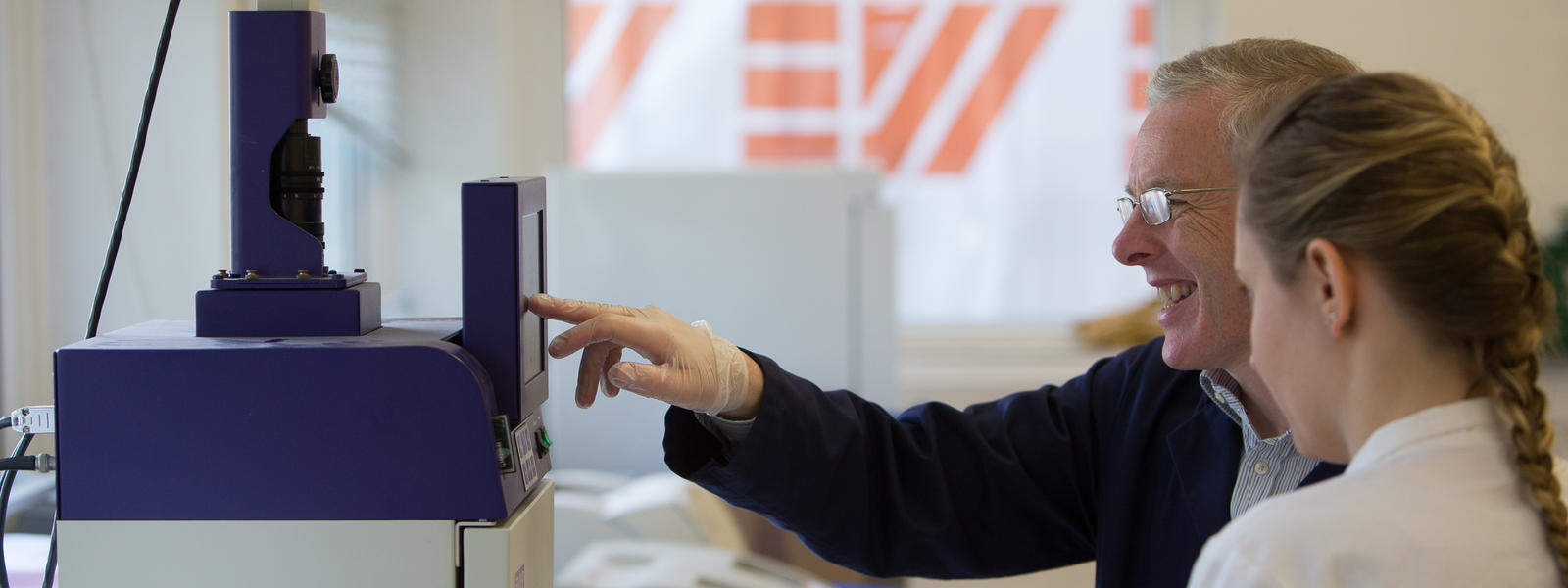
Just Like You
Before our academics were engaged in world-changing Bioscience research, they were just like you. They were curious about the world. They wouldn’t stop asking questions. They wanted to make a difference. And now they are. If that sounds like you, we want to hear from you. Apply today to study Biosciences at Lancaster University.
Scroll to content
First there was a spark; something that made them stop and think more deeply about the world; a desire to understand it and maybe change it. Read our academics' stories below.
Dr Rachael Rigby is a Senior Lecturer in Biomedical and Life Sciences. She’s been at Lancaster since 2008.
What are you working on at the moment?
My research is interested in how immune systems, with particular reference to intestinal immune systems, talk to our commensal microflora. Over the last ten years, this area of research has exploded: We are finding that the commensal microflora has a role in every disease that we look at, from mental wellbeing to cancer development. Certain microflora are protective against a range of cancers, and they also determine our response to certain drugs.
For example, in immunotherapy drugs for treating cancer, if you don’t have certain microflora you will be a non-responder to that therapy. So, the research seeks to understand at a cellular level, how these bacteria (and to an extent viruses) affect our immune systems.
If we figure out the factors that contribute to microflora differences, then we could test for responsiveness to certain drugs before the patient took them. This would be especially helpful in cancer patients where time is of the essence. In the future, we may be able to modify someone’s microflora to make them less susceptible to certain diseases.
What got you interested in studying diseases?
When I was in secondary school, I had ambitions to become a vet. I did work experience at a veterinary surgery when I was fifteen. It was really this experience that sparked my interest in disease; disease monitoring in large animals.
What did you study at University?
I studied Pathology and Microbiology at Bristol. But to be honest, it was only when I got into the lab in my final year that I really got into it. I was studying immunology with an amazing woman called Dr Sue Nicholls.
What did you do after you graduated?
I wasn't really sure what I wanted to do. I applied for a number of jobs and finally got work as a research assistant at Imperial College London. Through that I got funding to study for my PhD. At Imperial, I was studying pro-biotics. I went to give a talk at Digestive Disease Week, which that year was in San Diego, CA. I got a question from someone very well respected in the field, and I thought, 'I'd like to go and work with him', so I sent him a note to ask if he had any research openings. He said no, but he put me in touch with someone at the University of North Carolina, Chapel Hill. Funding ran out at UNC in 2008, but then the lectureship came up at Lancaster. It was a big change moving from pure research to teaching, but I've been here for 12 years now, so it must have been the right move.
What would you say to someone thinking about becoming a research scientist?
I would say go for it! Talk to people about it. Don't be shy about reaching out to people for information about it. You nearly always get a positive response. I love the freedom that being an independent researcher brings. I can go after whatever I'm most passionate about (funding permitting, of course).
Anything else?
The beauty of science is that it seeks out the truth. In a world where truth can sometimes seem like it can be bent one way or another, science aims to get to objectively true facts about the world. That for me is very satisfying.
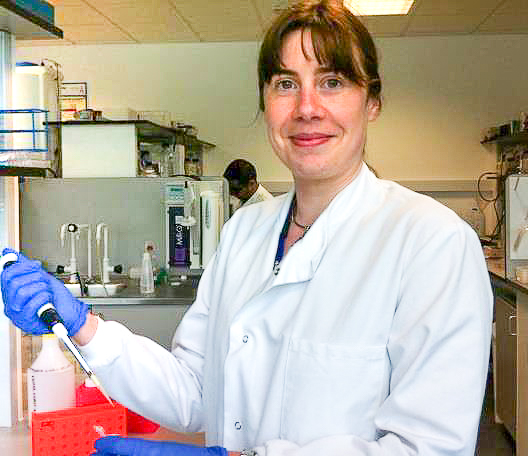
The beauty of science is that it seeks out the truth. In a world where truth can sometimes seem like it can be bent one way or another, science aims to get to objectively true facts about the world. That for me is very satisfying.
Professor Munir is a virologist working in the Division of Biomedical and Life Sciences.
Hi Munir. Can you tell us a little bit about how you got interested in the study of viruses?
There is quite a good linear progression between where I am now and where I started from -
I grew up in an environment where I saw so many diseases around, not just in humans but also in livestock. It made me curious to really understand why we get sick; why do we get so many diseases in livestock and humans. That was what really drove me to try to understand the mechanisms behind why we get sick.
I grew up in a small village in Pakistan and even then, I had all these questions in my mind.
When I was growing up, I had a dust allergy which prevented me from working in the family business (we made farming equipment). This gave me the chance to focus more on my education.
It’s hard to believe now, but I had to walk to school along a busy road, three kilometres each way, but I did it gladly, because I knew how important education was. At some point early on, one of our animals, a buffalo got sick and the vet came to treat it and I started to explore what he was really doing. The animal was so important to us, my family, the village. And I’d also seen people die from infectious diseases. Infectious diseases have been a part of my life since the beginning. It was the reason that I originally trained as a vet at the University of Agriculture in Faisalabad.
My thought then was to finish my veterinary training and then go and work in the field; helping my local community. I still do support that local community helping with funding for students who can’t afford their education.
You trained as a vet? So how did a vet become a virologist?
It was during my veterinary training that I again came up against the issues of disease. 60% of human diseases come from animals – zoonotic infections. When I was studying veterinary medicine, there was a large outbreak of H5N1 avian influenza, which turned out to be zoonotic. I wanted to understand how these viruses jump from animal to human, which is why I went back to study for my Master's in Microbiology.
I did well enough in my Master's that I got a scholarship to go and study at the Swedish University of Agricultural Sciences, Uppsala, Sweden. I started exploring how influenza had jumped from animals to humans, and I made seminal contributions to the understanding of zoonotic transmission.
Your research area is viruses. Can you speak a bit about viruses and vaccines?
If you think about vaccines for a moment, think about where we’ve come from: With Edward Jenner taking pustules from the teats of a cow and basically just injecting that into children, to today, where in ten months we’ve developed a vaccine that is 90% effective against this novel coronavirus. This didn’t just happen over the ten months of the pandemic, rather it began a hundred years ago with Edward Jenner.
The real problem is that anti-viral drugs are very difficult to come by because of the way viruses hijack our own immune system and cellular machinery. We can’t target our own cells to disadvantage the virus. We need vaccines because we don’t have other approaches. They are the most powerful approaches we have to combat and ultimately eradicate viral disease. And we do have very successful vaccines against coronaviruses in animals, in poultry and livestock, for example. That translational information really helped in determining what would work in this instance. That’s where I come in: Translating veterinary knowledge into humans.
For viruses, the key is really understanding the way they cause disease. First, we need to understand how the enemy operates, then we will be able to counteract.
What would you say to someone at secondary school thinking about pursuing science as a career?
Look for the questions. Try to find the answers around your own environment. There are so many questions in public health that still need answering. It’s not about answering questions related to someone else, it’s always answering questions that are related to you.
Studying science isn’t studying something else, it is studying yourself. We are an integral part of the science of public health, or medicine, or global health. You have an opportunity to study yourself – where do you stand in the environment? What are the risks being posed to humanity? What can you do to help?
Every project that I’ve done, they don’t really finish, they lead to new questions. That’s the beauty of a career in science; every day is a new day. The more you explore, the more pathways you find to explore further.
I want to encourage our young people to come into Biomedicine. The pandemic has highlighted just how important public health is.
You could work anywhere in the world. What makes Lancaster special?
I came to Lancaster from the Pirbright Institute where I was researching viruses under a (Biotechnology and Biological Sciences Research Council) BBSRC Fellowship. I was there for five years purely conducting research, but I wanted the opportunity to share my work with future scientists. I wanted to inspire future researchers; people to carry on my research.
I am the only virologist in the department. I exclusively teach virology. Inspiring students from my research labs.
I currently teach undergraduates in their first term of year one. It’s inspiring for me; to give them the opportunity to ask questions and to help them find the answers.
At Lancaster there is a high level of collegiality – lots of disciplines coming together to answer specific questions in a way that wouldn’t happen in a larger research setting. For example, I work with material scientists on creating antiviral surfaces for use in PPE, or hospitals, on stethoscopes, that kind of thing.
What about your own ambitions?
Every day that I come to the lab, I have new challenges and new ways to answer them. What I want to do is look at the broader picture of public health. What can I do to understand health issues better, and then communicate that, to students, to health bodies, that can ultimately benefit humanity?
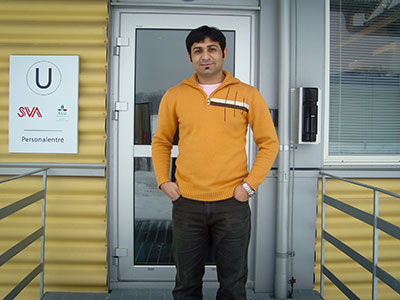
Every project that I’ve done leads to new questions. That’s the beauty of a career in science; every day is a new day. The more you explore, the more pathways you find to explore further.
Dr Sue Broughton is a Senior Lecturer in biomedical sciences at Lancaster University
Hi Sue. Can you tell us a bit about what got you started on your career as a research scientist?
I think I’d always known I would be a scientist but I took quite a non-conventional route to get to where I am now, a Senior Lecturer in biomedical sciences at Lancaster University.
As a child, I just wanted to know how things worked so I was naturally drawn to science at school. Although I was in high school when girls did cookery and boys did metal or woodwork, I was lucky to have more progressive science teachers. I did Biology, Chemistry and Physics at O and A level and went on to do a Biological Sciences degree at Leicester University.
What did you do when you graduated?
I wanted to do some travelling around the world with friends before I settled down. First of all, I had to earn some money so I went to London and ‘temped’ for a few months before flying off to the US. I travelled around the US, Mexico and Canada for 3 months, temped back in London for another few months and then flew to Tokyo, Japan, to stay with a friend from the UK who had got a job with a Japanese bank. I expected to stay in Tokyo for a year teaching English but I managed to get myself a ‘proper’ job working for Shaklee Japan KK, a health food company that was part of a Japanese pharmaceutical company. I stayed in Japan for three and a half years and had an amazing time learning about the culture and the language, and meeting so many interesting people.
And then you wanted to get back into research?
Yes. I realised that I wanted to get back to biology and it was time to get a PhD. As I was already away from the UK I didn’t head back home to study. Spending so much time in a different country and experiencing other cultures opened my mind to other ways of doing things and I decided to go to New York. To make this happen, I visited one of my lecturers (Professor Bambos Kyriacou) at Leicester University. I asked him for a reference and if he knew anyone I should work with in New York. He said yes to both, thankfully, and put me in touch with someone who would become my PhD supervisor at NYU, Professor Ralph Greenspan. I spent 5 and a half years at New York University and a year at Brandeis University in Boston with Professor Jeff Hall, carrying out my thesis research on the neural circuitry underlying male courtship behaviour in Drosophila melanogaster. I was awarded my doctorate from NYU in 2002 and it was at that point that I came back to the UK to work at UCL in London as a post-doc in Professor Linda Partridge’s lab investigating the role of insulin/IGF-like signalling (IIS) in the endocrine modulation of ageing.
So, what do you do now?
I joined Lancaster University in 2009 as a Lecturer, which brought together my two areas of interest, neuroscience and ageing, to work on the role of IIS in brain ageing. Given my research interests I teach on genetics, neurobiology and biology of ageing modules. For me, the most enjoyable part of being an academic is having students in my research lab and I hope I inspire at least some of them to become our future scientists.
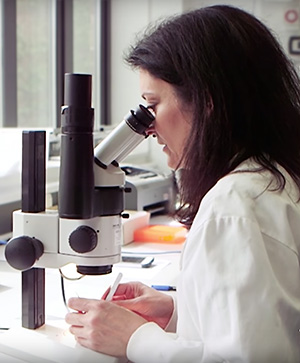
The most enjoyable part of being an academic is having students in my research lab and I hope I inspire at least some of them to become our future scientists.
Dr Alex Bush is lecturer of environmental remote sensing, working in the Lancaster Environment Centre.
Hi Alex, what first inspired you to begin your career in the sciences?
The conservation crisis is something we’ve lived with our whole lives so trying to help resolve that is pretty motivating. I would also say my childhood fascination was built by reading the books of Gerald Durrell – exploring new worlds and enjoying observing nature.
Where did you study?
At the University of East Anglia, I did a Bsc in Ecology with a year abroad in Australia (4 years altogether). Later I applied for PhD positions and ended up going back to Macquarie University in Sydney where I had studied before.
Has the route you’ve taken to become an academic been straightforward?
Somewhat, but it never felt like it. After my undergrad I wanted to get out of university for a while and get a job. It took nine months of volunteering for the Somerset Wildlife Trust before I had the right field experience to get a job with an engineering consultancy. After a couple of years I learnt that wasn’t for me, and the global financial crash came just as I confirmed I would start my PhD in Australia. After graduating I moved cities to Canberra for my first postdoc, and then again to New Brunswick in Canada. With pressures of visas and funding changes looming I applied to LEC.
How long have you been at Lancaster and where were you before?
I’ve been here just under 2 years; previously in Fredericton, Canada.
What is your research area and why does it interest you?
I study how we can use remotely sensed data from satellites, planes and drones to estimate ecosystem condition to help make it possible for biodiversity to be considered strategically by policy makers at large scales. We are now able to collect data at unprecedented scales and quality that would have taken entire careers in the past, and consequently able to answer new questions about ecosystem change.
What is it about your work that you love?
We are entering an dangerous time where damage to ecosystem and the planet may start to become irreversible. But we also have a really wide array of new tools to understand and describe the natural world in unprecedented detail. We therefore have an opportunity to ensure people have the right data and advice they need to turn things around and build a more sustainable society in the future.
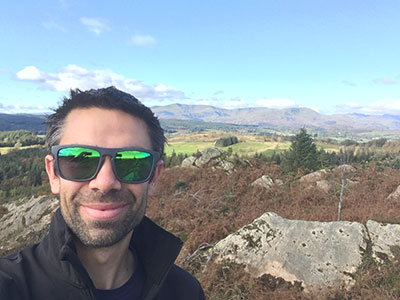
The conservation crisis is something we’ve lived with our whole lives so trying to help resolve that is pretty motivating.
Dr Lucy Jackson-Jones is an Immunologist working in the Division of Biomedical and Life Sciences at Lancaster University
What first inspired you to begin your career in the sciences?
Growing up I didn’t really know what I wanted to be, I remember considering architecture at one point but by the time I was doing my AS Levels I had my heart set on studying Medicine. I started studying Medicine at Newcastle University and lasted a term before having a change of heart and taking the rest of the year off. I chose to have another try at University as a result of top-up fees forcing my hand – it felt like it was now or never to get a degree and biology was a subject that came easily to me.
So, where did you study?
University of Edinburgh for both Undergraduate and Postgraduate. I started with a BSc in Biological Sciences with Honours in Immunology then completed an MRes in the Life Sciences during the first year of my Wellcome Trust funded 4 year PhD
Has the route you’ve taken to become an academic been straightforward?
Yes & no! Since choosing biology I’ve taken a straightforward route, but I’ve taken a route that is often discouraged - I stayed at the same University for my UG, PhD & post-doctoral work. People love to say you should move, but the research I was interested in and wanted to pursue was World-leading in Edinburgh and I had job offers to work in top laboratories so I stayed. In my situation, it was actually beneficial, I didn’t experience all the down time that relocation brings.
How long have you been at Lancaster and where were you before?
I moved from Edinburgh to start my own research group at Lancaster in 2018; a move that enabled me to move my family back to the Lake District where my husband I both grew up.
What is your research area and why does it interest you?
I’m an immunologist - I switched to Immunology the first week of the final year of my undergraduate degree - I had one lecture on immunology as part of a microbiology course and I made the snap decision to switch courses. I’ve been an immunologist ever since. I love how complicated it is and how amazing it is that we have this intricate, unbelievable system of protection within each of us. I marvel every day at the experimental research that has gone before to allow researchers now to be able to design medical interventions such as vaccines, check-point inhibitors and biologics such as anti-TNFα. My laboratory focuses on how immune cells within the linings of our bodies protect us against diseases such as allergy, mesothelioma & peritonitis.
What is it about your work that you love?
I love all of it! I get to ask questions about how the immune system works, design experiments to address those curiosities and then pursue the myriad additional questions that each experiment usually opens up. It’s one massive puzzle whose answers may contribute to improving people’s lives.
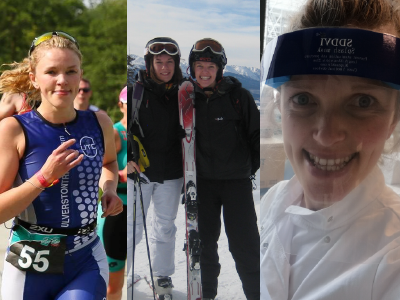
I get to ask questions about how the immune system works, design experiments to address those curiosities and then pursue the myriad additional questions that each experiment usually opens up. It’s one massive puzzle whose answers may contribute to improving people’s lives.
Professor Kenneth Wilson is an Ecologist working in the Lancaster Environment Centre.
Hi Ken, can you tell us what first inspired you to begin your career in the sciences?
I wanted to be like David Attenborough and study animals in Africa and eventually, I did. I had that dream when I was young, and I stuck to it.
Where did you study?
I did my undergraduate studies in Zoology at the University of Nottingham, and then went on to study for my PhD in Animal Behaviour/Entomology at the University of Sheffield.
Has the route you’ve taken to become an academic been straightforward?
No, it hasn't. I originally ‘failed’ my A levels in that my grades were not good enough to do the degree I wanted to do, so I re-sat the whole year and passed second time around. Because I knew what I wanted to do (study animals in Africa), I was determined to not let that stop me. I would say to anyone in the same position, if you really want it, find a way.
How long have you been at Lancaster and where were you before?
I have now been in Lancaster nearly 17 years. Before that, I was a lecturer at the University of Stirling I Scotland for 7 years.
What is your research area and why does it interest you?
I am interested in insects and their diseases, and it interests me because it allows me to address fundamental questions in ecology and evolution, as well as more applied questions such as how we can harness insect diseases to control crop pests.
What is it about your work that you love?
The freedom to teach and research whatever interests me (more or less).

The great thing about being a scientist is that every day I get to learn something new and that every answer I reveal leads to yet more interesting questions. Science is never boring and you get the opportunity to contribute to the greater good.
Dr Andrew Fielding is a North West Cancer Research Lecturer
Hi Andrew, can you tell us about what first inspired you to begin your career in the sciences?
Well, when I was younger I was very interested in nature and the outdoors in general and I really enjoyed biology and chemistry at school, so I did my undergraduate degree in Biochemistry. During my undergraduate studies I realised that I actually preferred biology and so I chose cell biology for my PhD at the University of Glasgow. My PhD taught me techniques such as microscopy and cell imaging and for me, seeing is believing, so being able to directly see what happens to a cell as it grows intrigued me.
And what led you to cancer research?
Following my PhD, I completed my first post-doctoral job in Vancouver, Canada at the British Columbia Cancer Research centre, which is where my cancer research career began as I used my cell biology expertise to study cancer cells and how they grew and divided. I then returned to the UK for a further two post-doctoral roles at Liverpool University.
What brought you to Lancaster?
The department secured funding from North West Cancer Research (NWCR) to employ a lecturer and I applied and got it.
I already knew about NWCR and had projects at Liverpool University funded by them and it gave me the opportunity to have my own research group which was very appealing.
What does a typical day in your lab look like?
My team and I are working on new methods to specifically treat hard to treat cancers. A lot of cancers now, because of developments and research, have good treatments but some cancers, like triple negative breast cancer, still really lack targeted treatments so that is our focus.
We are a cancer cell biology lab working with cell culture models of cancers and so we grow those cells and then we either manipulate them to find out the function of the gene or a protein and see what happens or we treat them with a drug we think may help prevent their growth.
A typical day may start in our cell culture lab where we grow and treat these cells. One of our main outputs is to image those cells so we look at them down a microscope to see how they’ve changed in response to a treatment we’ve applied to them.
Can you tell us about some of the real world impacts your work has had.
To begin with, a lot of my research was in cell biology models and that will impact through in various ways. For example, in Vancouver we did a drug screen for drugs that would interfere with cancer cell growth and this work identified some pathways and drugs that would target specific cancer types.
At present I have a couple of ongoing projects.
My team and I are trying to discover pathways that specifically inhibit the growth of triple negative breast cancer cells, and we have found some so we now have a project to try and develop novel drugs, so moving from pure biology to drug development.
My other project is in collaboration with a research group at Liverpool University. Every year a few hundred people in the UK are diagnosed with uveal melanoma, a rare type of eye cancer. Half of all patients with this cancer are treated at Liverpool University, as it's a centre for excellence with a group dedicated to oncology, patient care and research into better treatments.
What exactly is triple negative breast cancer?
There are four main sub types of breast cancer, three of them have good targeted therapies but the other, triple negative, does not. About 15% of people who develop breast cancer have the triple negative subtype and there are currently no targeted therapies, so my work explores ways to inhibit the growth of this cancer type
What would you say to a young person considering a life in science?
Pursue what you’re interested in and what you enjoy. Keep an open mind early on and as your interests develop look out for opportunities to get involved in those areas.
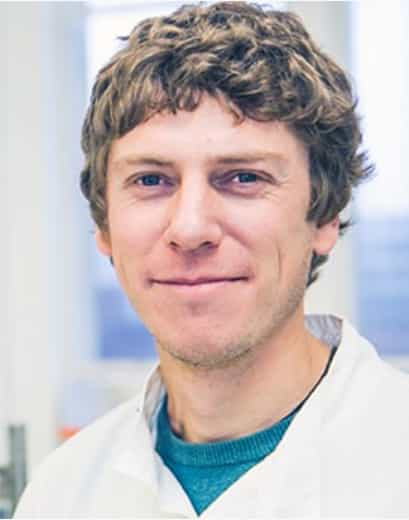
Professor Martin McAinsh is a Plant Cell Biologist. He has been at Lancaster University since 1992.
What first inspired you to begin your career in the sciences?
Science is in my family’s DNA albeit physics and engineering rather than biology. So, although it sounds a bit of a cliché, it was my biology teacher at secondary school and their enthusiasm and passion for the subject which inspired me to want to study the living world and who ultimately lead me to go onto to University to study biology. I then had the privilege of being mentored by an inspirational early career ‘New Blood’ lecturer during my postgraduate and postdoctoral research whose passion and commitment to science communication, education and research inspired me and many others who passed through their lab to pursue a career in science.
My undergraduate degree is from the University of Sussex and my postgraduate studies were all at Lancaster University.
Has the route you’ve taken to become an academic been straightforward?
I hate to say it but yes. I have led a charmed life on my route to becoming an academic. After publishing five scientific papers during my PhD I was able to obtain a postdoctoral position in a lab working at the cutting edge of a new and exciting field of cell biology and which quickly become the world leader in the field. Within one year of starting this position I had publish my first paper in Nature, the world’s premier scientific journal, and in the following year I obtained a Lectureship at Edinburgh University. In my first year as a Lecturer at Edinburgh however I obtained a prestigious 10 year independent research fellowship from The Royal Society in London which I brought to Lancaster to become the University’s first Royal Society University Research Fellowship. I was promoted to Senior Lecturer and then Reader during my fellowship, and was subsequently awarded a personal chair.
How long have you been at Lancaster and where were you before?
I’m like a stick of rock – if you break me in half you’ll find Lancaster written down the middle of me. I’ve currently been at Lancaster since 1992 when I brought my Royal Society University Research Fellowship to the University. Before that I was a Lecture at the University of Edinburgh. However, prior to this I was both a postgraduate student and a postdoctoral researcher at Lancaster.
What is your research area and why does it interest you?
I’m a plant cell biologist investigating the mechanisms by which plants respond to climate change-related changes in their environment including drought, elevated carbon dioxide, and ozone pollution. The aim of my research is to apply an understanding of the cellular and molecular basis of how plants tolerate these environmental stresses to improve agricultural sustainability and global food security. This has resulted in a shift in my research focus in recent years from fundamental science studies investigating stress signalling in plant cells to applied research working with agribusiness using this knowledge to develop solutions for increasing the yield and nutritional quality of crops including vertical growing technologies, ‘plant factories’ and urban agriculture in parallel with approaches for reducing waste in the supply chain. After over 32 years investigating plant-environment interactions, it is the diversity of the research projects in my lab and the fact that we are now in a position to apply fundamental science-based solutions to address some of the biggest questions of our time, namely global food security and food inequality, that continues to fuel my passions for research.
What is it about your work that you love?
I love my work because no day ‘in the office’ is ever the same. It’s the reasons why each day is different however which makes me really love my work. Every day presents a new set of challenges. Whether it’s helping students grapple with scientific concepts, the most difficult being the ephemeral nature of scientific knowledge (always a toughie), or maximising the real-world impact of the science performed in my lab, there’s never a dull day. And if, along the way I can help inspire the next generation of scientists in the same way as my school biology teacher and university mentor inspired me to begin a career in science, then it’s been a good day’s work.
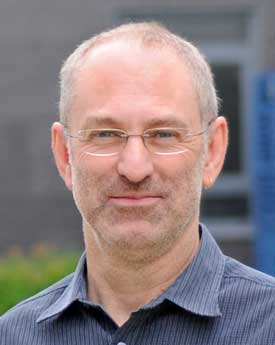
If I can help inspire the next generation of scientists in the same way as my school biology teacher and university mentor inspired me to begin a career in science, then it’s been a good day’s work.

Get the new Biosciences course guide
Whether your passion is Biology, Biomedicine, Biochemistry or any of our other programmes, you'll find details about the course, student stories, placement information and much more in our new course guide.
UG Subject Brochure
